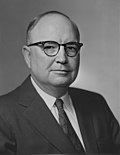| | |||||||||||||||||||||
| |||||||||||||||||||||
 County results Eastland: 40-50% 50-60% 60-70% 70-80% 80-90% Walker: 40-50% 50-60% 60-70% | |||||||||||||||||||||
| |||||||||||||||||||||
| Elections in Mississippi |
|---|
 |
The 1966 United States Senate election in Mississippi was held on November 8, 1966.
Contents
- Democratic primary
- Candidates
- Results
- Republican primary
- Candidates 2
- Results 2
- Independents and third parties
- Mississippi Freedom Democratic
- General election
- Campaign
- Results 3
- See also
- References
Incumbent James Eastland, who first entered the Senate on 1941, was re-elected to a fifth term in office. He was challenged by U.S. Representative Prentiss Walker. Walker was the first Republican elected to Congress from Mississippi since Reconstruction and was also the first such competitive Senate candidate. [1]



